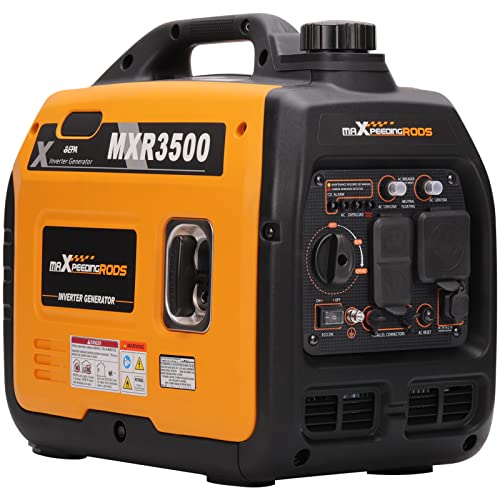RV Generator Size Calculator
Calculate the right generator size for your RV by entering your appliances and power requirements below.
List of the Top 10 Best Generator for RV:
Understanding RV Generator Sizing
Selecting the right generator for your RV is crucial for a comfortable camping experience. This guide will help you understand the key factors in choosing the perfect generator size for your RV's specific needs.
RV Generator Types and Uses
| Type | Size Range | Best For | Typical Applications |
|---|---|---|---|
| Small Portable | 2,000-3,000W | Basic RV needs, camping | Small appliances, lights, TV, charging devices |
| Medium Inverter | 3,000-4,000W | Medium-sized RVs | 13.5K BTU A/C, microwave, multiple appliances |
| Large Portable | 4,000-5,500W | Larger RVs, full-time RVing | 15K BTU A/C, multiple systems, high-draw appliances |
| Built-in RV | 2,800-7,000W | Integrated power solution | Whole RV systems, automatic operation |
Common RV Appliance Power Requirements
| Appliance | Running Watts | Starting Watts | Notes |
|---|---|---|---|
| RV Air Conditioner (13,500 BTU) | 1,500W | 3,500W | Highest surge draw in most RVs |
| RV Air Conditioner (15,000 BTU) | 1,800W | 4,000W | Common in larger RVs |
| RV Refrigerator | 400-600W | 800-1,200W | Varies by size and type |
| Microwave Oven | 1,000-1,500W | 1,000-1,500W | Check actual wattage on unit |
| Electric Water Heater | 1,500W | 1,500W | Consider gas alternative |
| Coffee Maker | 600-1,200W | 600-1,200W | Varies by type |
| TV/Entertainment System | 200-400W | 200-400W | Includes satellite/gaming |
| Laptop/Device Charging | 50-200W | 50-200W | Multiple devices |
Key Features to Consider in RV Generators
1. Generator Type Selection
- Conventional Generators:
- More powerful
- Generally less expensive
- Louder operation
- Less fuel efficient
- Inverter Generators:
- Clean power for electronics
- Quieter operation
- More fuel efficient
- Usually more expensive
2. Noise Considerations
- Campground Requirements: Many limit noise to 60-65 dB
- National Parks: Often have strict noise regulations
- Quiet Hours: Typically more restrictive at night
- Neighbor Courtesy: Lower noise levels for better camping experience
3. Portability Features
- Weight: Consider storage location and handling
- Size: Must fit in available storage compartment
- Wheels: Important for larger units
- Handle Design: Helps with movement and positioning
RV Generator Safety Guidelines
Operation Safety
- Placement:
- Minimum 20 feet from RV
- Away from windows and vents
- On level, stable ground
- Protected from weather
- Carbon Monoxide Safety:
- Always use CO detectors
- Never operate near RV openings
- Consider wind direction
- Regular CO detector testing
Maintenance Requirements
Regular Maintenance Schedule
- Before Each Trip:
- Check oil level
- Inspect air filter
- Test run generator
- Check fuel system
- Every 3 Months:
- Change oil
- Service air filter
- Check spark plug
Frequently Asked Questions
How do I determine if my RV generator is large enough?
Consider these factors:
- Total power needs of all appliances
- Starting watts of air conditioner
- Simultaneous usage patterns
- Future power needs
Can I run my RV air conditioner on a portable generator?
Important considerations:
- Most RV A/C units need 3,000-4,000W starting power
- Inverter generators recommended
- Generator must be properly sized
- Altitude affects generator performance
What's the difference between built-in and portable RV generators?
Key differences:
- Built-in Generators:
- Integrated fuel system
- Automatic operation
- Weather protected
- Higher initial cost
- Portable Generators:
- More versatile use
- Lower initial cost
- Easier maintenance
- Storage required
How long will my RV generator run on a tank of fuel?
Runtime depends on:
- Generator efficiency
- Load percentage
- Tank size
- Type of fuel used
Should I choose a dual fuel generator for my RV?
Consider these advantages:
- Benefits:
- Fuel flexibility
- Extended runtime options
- Propane availability at campgrounds
- Cleaner burning option
- Drawbacks:
- Higher initial cost
- More maintenance
- Added complexity
- Slightly lower power on propane









